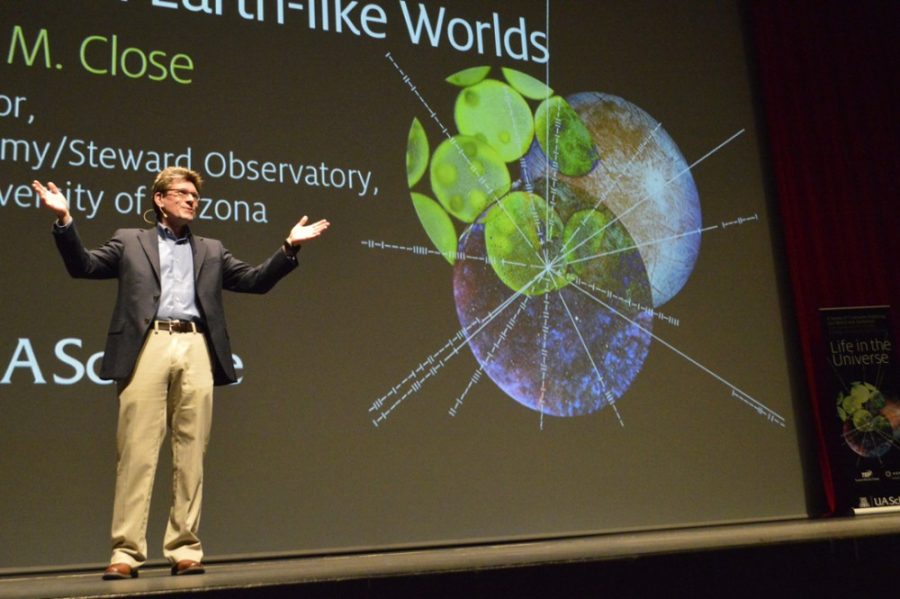The College of Science is wrapping up the 10th season of its Public Lecture Series on Monday, the 2015 edition of which was about the possibility of life in the universe. The last lecture takes place at 7 p.m. Monday at Centennial Hall.
“[These lectures] are important because it’s a big piece of our connection with the community,” said Chris Impey, an astronomy professor and member of the lecture series organizing group. Impey will finish the series with the discussion “Intelligent Life Beyond Earth.”
John Athans, a UA College of Pharmacy alumnus, returned to campus to attend the lectures, which are presented by leading researchers in their fields.
“I like to learn, … [but] It’s hard to find a credible source [to learn from],” Athans said. “That’s why these lectures are so important.”
For seven weeks this spring, lecturers from the UA and elsewhere delivered cutting-edge research to the public at a level that is not overly simplified but also not technical, said Impey.
The first lecture series kicked off in 2006 and discussed the science of evolution. Since then, topics have ranged from neuroscience to climate change to cosmology.
“I think it’s important that the information comes from people who really are a part of the story,” said Tim Swindle, director of the Lunar and Planetary Laboratory and head of the UA Planetary Sciences department. “But it’s not just us talking about what we’ve done, but what all sorts of different people [in the field] have done.”
Putting a face behind research is important now more than ever to remind people that science is a human endeavor.
“Science is a process,” Swindle said. “And the more people understand how scientists think and why they think the things they think, the better off we are as a civilization.”
Athans said he’s noticed a difference in the lectures over the years: They have become more popular.
“I would say it’s the best kept secret in Tucson,” Athans said, “but … it seems like you have to keep coming earlier every year to find a seat.”
On the first night of the series this spring, both halls were so full, some attendees were basically turned away.
Attendance has grown rapidly over the years. According to Impey, about 2,500 people, not including the overflow, go to the talks. Most lectures fill Centennial Hall and then spill over into a lecture hall reserved in the Social Sciences building.
“This one in particular has done well, because the question of ‘Is there life out there?’ is fundamental,” Swindle said. “Everyone has thought about it, and getting the chance to hear what we actually know about it … is fun.”
Tucson is the perfect place for this, according to Swindle, as it’s a college town with a world-class research university and also a large population of retirees who want to continue learning.
“There isn’t a city in the country that has a science lecture series that draws [in] as many people as this one does,” Swindle said.
Swindle said his own passion for science began in kindergarten with the space race, and that the lectures will hopefully inspire the public with science as researchers continue to push the boundaries of knowledge.
“We’re even starting to learn about planets around other stars,” Swindle said. “Twenty-five years ago, we knew about zero planets around other stars. Now it’s in the thousands, and we’re starting to get compositions of atmospheres around planets around other stars. It’s just this boom in knowledge.”
_______________
Follow Mikayla Mace on Twitter.









